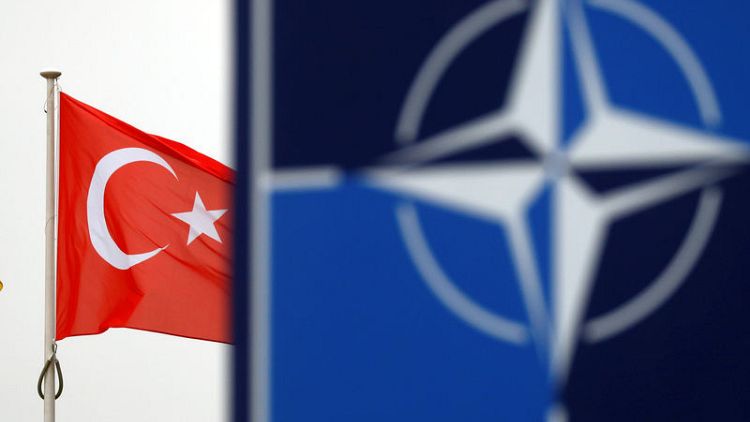By Robin Emmott
BRUSSELS (Reuters) - Turkey is refusing to back a NATO defence plan for the Baltics and Poland until the alliance offers Ankara more political support for its fight against Kurdish YPG militia in northern Syria, four senior alliance sources said.
Ankara has told its NATO envoy not to sign off on the plan and is taking a tough line in meetings and in private conversations, demanding the alliance recognise the YPG as terrorists in the formal wording, the sources said.
Turkey's NATO delegation was not immediately available for comment. Turkey's defence and foreign ministries did not respond to requests for comment.
The dispute, before NATO holds its 70th anniversary summit in London next week, is a sign of divisions between Ankara and Washington over Turkey's offensive in northern Syria against the YPG militia, which it regards as terrorists with links to Kurdish militants on Turkish soil.
NATO envoys are seeking formal approval by all 29 member states for the military plan to defend Poland, Lithuania, Latvia and Estonia in the event of a Russian attack.
Without Turkey's approval, it could be harder for NATO to step up its defences in the Baltics and Poland quickly.
"They (the Turks) are taking eastern Europeans hostage, blocking approval of this military planning until they get concessions," one of the diplomatic sources told Reuters.
A second source called Turkey's behaviour "disruptive" as NATO tries to show it is united after U.S. President Donald Trump voiced scepticism about the alliance and French President Emmanuel Macron suggested it was experiencing "brain death".
Asked about the issue, NATO's spokeswoman Oana Lungescu said: "NATO has plans for defending all allies. NATO's commitment to the safety and security of all allies is unwavering."
Turkey began its offensive in northern Syria after the United States pulled 1,000 troops out of the area last month. Ankara's NATO allies fear the incursion will undermine the battle against Islamic State militants.
COLLECTIVE DEFENCE
The plan for the Baltic states and Poland, drawn up at their request after Russia annexed Crimea from Ukraine in 2014, has no direct bearing on Turkey's strategy in Syria, but it raises issues about security on all of NATO's frontiers.
Under the North Atlantic Treaty Organisation's 1949 founding treaty, an attack on one ally is an attack on all, and the alliance has military strategies for collective defence across its territory.
Turkey made its demands before its offensive in northern Syria but the issue has come to a head because of next week's summit, at which security documents are to be approved.
NATO envoys still hope for a compromise because Ankara also needs leaders to approve a separate, upgraded military plan detailing how NATO would defend Turkey in the event of an attack, two of the diplomatic sources said.
Macron, Turkish President Tayyip Erdogan, German Chancellor Angela Merkel and British Prime Minister Boris Johnson will meet on the summit's margins to discuss Ankara's Syria operation.
"Everyone is criticising them (the Turks), but if they give in, it will be at the cost of non-interference in their Syria strategy," one of the diplomatic sources said.
(Editing by Timothy Heritage)
